Donald Trump’s impeachment trial begins, senators vow ‘impartial justice’
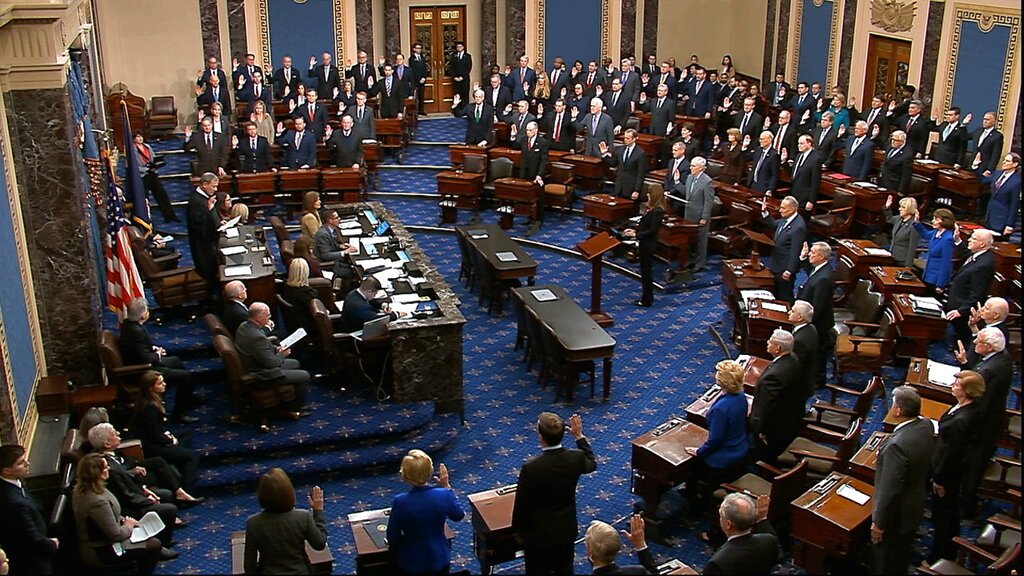
Senators said later that when Roberts appeared the solemnity of the occasion took hold.
Donald Trump likens House impeachment inquiry to ‘a lynching’

President Donald Trump enraged Democrats on Tuesday by comparing their impeachment inquiry to a lynching, assigning the horrors of a deadly and racist chapter in U.S. history to a process laid out in the Constitution. “That is one word no president ought to apply to himself,” said Democratic Rep. James Clyburn of South Carolina, the highest-ranking African American in Congress. “That is a word that we ought to be very, very careful about using” he said. Rep. Bobby Rush, Democrat-Illinois, called on Trump to delete the tweet. “Do you know how many people who look like me have been lynched, since the inception of this country, by people who look like you. Delete this tweet,” wrote Rush, who is also black. Sen. Doug Jones, Democrat-Alabama, tweeted to Trump: “No sir! No, @realDonaldTrump: this is NOT a lynching, and shame on you for invoking such a horrific act that was used as a weapon to terrorize and murder African Americans.” Republicans legislators largely tried to put the focus on what they said was the unfair way in which Democrats are conducting the impeachment inquirySen. Lindsey Graham, Republican-South Carolina, said Trump’s description was “pretty well accurate.” He called the impeachment effort a “sham” and a “joke” because the president does not know the identity of his accuser, and the process is playing out in private. Lynchings, or hangings, were used mostly by whites against black men in the South, beginning in the late 19th century amid rising racial tensions. By comparing his possible impeachment to a lynching, Trump also likened Democrats to a lynch mob. Under pressure over impeachment, blowback over his Syria policy and other issues, the Republican president tweeted Tuesday: “So some day, if a Democrat becomes President and the Republicans win the House, even by a tiny margin, they can impeach the President, without due process or fairness or any legal rights. “All Republicans must remember what they are witnessing here — a lynching. But we will WIN!” Trump has a habit of trying to portray himself as the victim. His tweet came a day after he lashed out at critics of his decision — since rescinded — to schedule a major international economic summit for 2020 at one of his Florida golf properties. During remarks Monday, he lamented people who invoke the “phony emoluments clause.” The clause is in the Constitution and bans presidents from receiving gifts or payments from foreign governments, without the consent of Congress. Impeachment and its process are also in the Constitution. A whistleblower’s complaint that Trump was attempting to use his office for personal political gain during a July 25 phone conversation with Ukraine’s president led House Speaker Nancy Pelosi to open the impeachment inquiry. Trump insists he did nothing wrong. He has characterized the conversation with Ukrainian President Volodymyr Zelenskiy as “perfect” and argues that sore-loser Democrats are still trying to overturn the 2016 election that put him in the White House and keep him from winning a second term next year. Lynchings were fueled by anger toward blacks across the South, where many whites blamed their financial problems on newly freed slaves living around them, the NAACP n By Darlene Superville Associated Press Notes. Follow Darlene Superville on Twitter: http://www.twitter.com/dsupervilleap Republished with the permission of the Associated Press.
Daniel Sutter: The economic value of national unity
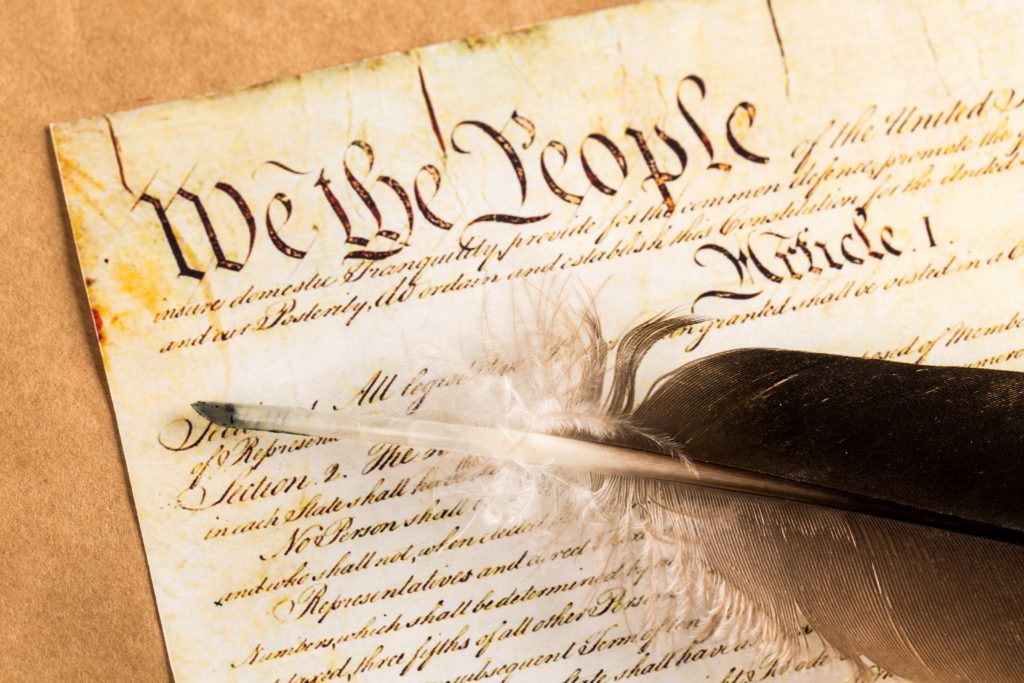
The Edmund Burke Foundation recently hosted the National Conservatism Conference which explored, among other questions, the meaning and importance of patriotic national unity. Conference organizer Yoram Hazony argued that conservatives need to break away from the libertarian and classical liberal idea of the “individual … as the only thing that matters in politics.” Politics is about citizens pursuing their common interests, and the bonds formed in this pursuit are important for the economy as well. America’s founders were liberals, or the classical liberals mentioned by Mr. Hazony. Liberalism maintained that governments were supposed to serve people, not the other way around. This idea was radical at the time, and had been established slowly in England over centuries. England’s “constitution” was never written down or formally adopted. In the 1770’s, King George III was pushing for more royal prerogative. Our founders’ decided to create a country based on an idea, not ethnicity or military conquest. And the idea was freedom. Founding a nation based on agreement among citizens follows naturally from the political theory of liberals like Hobbes, Locke and Montesquieu. The consent of the governed legitimates government, and the Declaration of Independence, the Constitution, and the Bill of Rights made this explicit. A nation can only have one set of institutions. Politicians will either have limited or unlimited power. Property rights and economic freedom will either be respected or not. Either people will be free to live, or must get permission to move, work, or worship. America’s institutions – limited government, markets, and personal freedom – achieve the founders’ values. Institutions significantly impact economic performance and prosperity. Physical capital (factories, mines, and farms) produces our goods and services, but secure property rights encourage people to make these investments. Limited government secured through representative democracy establishes the rule of law. The citizens of a nation must accept its institutions, and by implication, the values the institutions embody. Acceptance based on genuine agreement binds people together. Even if everyone agreed on fundamental values like life, liberty, and the pursuit of happiness, disagreements will arise on specifics or the form of government to best secure these values. No one gets exactly what they want. We agree to respect our differences and not let them tear us apart. Libertarians emphasize the universal nature of human rights. The Declaration of Independence’s rights to life, liberty, and the pursuit of happiness apply to all people, even when ignored by a dictator. Many libertarians’ internationalism, I think, offends conservatives’ strong sense of nationalism. Yet I think there should be common ground here. Not all people agree on fundamental human rights. People who believe in freedom can found a country based on this. A foundation in freedom has enabled America to accommodate so many immigrants historically. Americans’ shared values more than offset racial, religious and linguistic differences. The citizens of a free nation effectively bond together to protect these values and the institutions which secure them. This is how politics is about more than just individuals. And it must be, because many people and nations which do not accept freedom will act in criminal and imperial ways. Freedom isn’t free, and citizens must protect each other’s freedom. Shared values and the commitment to defend each other also produce trust, or a widespread belief that fellow citizens are not trying to take advantage of them. Research demonstrates the economic value of trust, even when controlling for institutions like the rule of law and economic freedom. Markets function better when employers trust employees, businesses trust customers, investors trust financial institutions, and so on. Politics is about more than individuals. In a free country, politics involves a shared commitment to protect our fellow citizens’ freedom. And freedom allows individuals to pursue their happiness in many different ways. Daniel Sutter is the Charles G. Koch Professor of Economics with the Manuel H. Johnson Center for Political Economy at Troy University and host of Econversations on TrojanVision. The opinions expressed in this column are the author’s and do not necessarily reflect the views of Troy University.
Neil Gorsuch sworn into Supreme Court, vows to serve Constitution
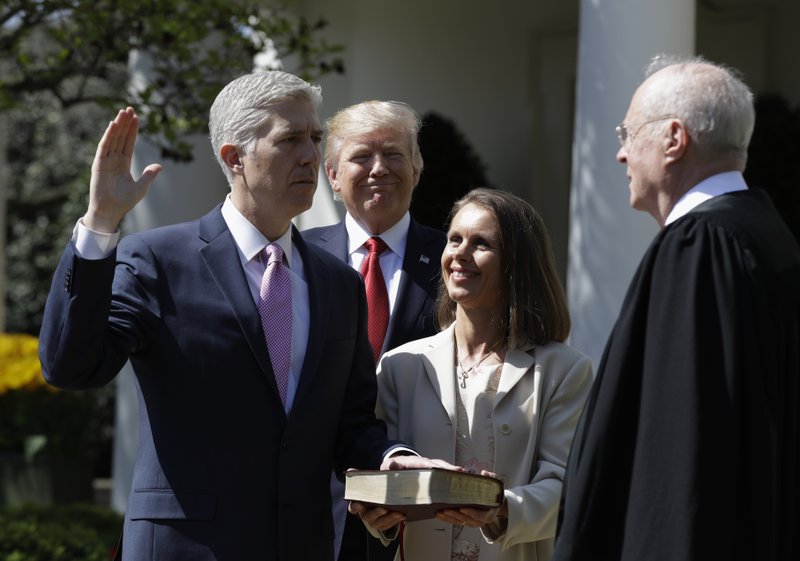
President Donald Trump praised new Supreme Court Justice Neil Gorsuch during a White House swearing-in ceremony on Monday as a jurist who will rule “not on his personal preferences but based on a fair and objective reading of the law.” In the Rose Garden ceremony, Trump said Americans would see in Gorsuch “a man who is deeply faithful to the Constitution of the United States” and predicted greatness for the 49-year-old former appeals court judge from Colorado. “I have no doubt you will go down as one of the truly great justices in the history of the U.S.,” Trump said. The president noted that the successful nomination came during his first 100 days in office and added: “You think that’s easy?” Gorsuch, who restores the court’s conservative majority, was sworn in during the ceremony by Justice Anthony Kennedy, for whom he once served as a law clerk. It was the second of two oaths — the first was conducted privately in the Justices’ Conference Room by Chief Justice John Roberts. In remarks in the Rose Garden, Gorsuch said he was humbled by his ascendance to the nation’s high court and thanked his former law clerks, saying of his former law clerks, “your names are etched in my heart forever.” Gorsuch promised to be a “faithful servant of the Constitution and laws of this great nation.” He fills the nearly 14-month-old vacancy created after the death of the late Justice Antonin Scalia, who anchored the court’s conservative wing for nearly three decades before he died unexpectedly in February 2016. In nominating Gorsuch, Trump said he fulfilled a campaign pledge to pick someone in the mold of Scalia. During 11 years on the federal appeals court in Denver, Gorsuch mirrored Scalia’s originalist approach to the law, interpreting the Constitution according to the meaning understood by those who drafted it. Like Scalia, Gorsuch is a gifted writer with a flair for turning legal jargon into plain language people can understand. Gorsuch will be seated just in time to hear one of the biggest cases of the term: a religious rights dispute over a Missouri law that bars churches from receiving public funds for general aid programs. His 66-day confirmation process was swift, but bitterly divisive. It saw Senate Republicans trigger the “nuclear option” to eliminate the 60-vote filibuster threshold for Gorsuch and all future high court nominees. The change allowed the Senate to hold a final vote to approve Gorsuch with a simple majority. Most Democrats refused to support Gorsuch because they were still seething over the Republican blockade last year of President Barack Obama‘s pick for the same seat, Merrick Garland. Senate Republicans refused to even hold a hearing for Garland, saying a high court replacement should be up to the next president. The White House swearing-in ceremony was a departure from recent history. Justices Sonia Sotomayor and Elena Kagan were both sworn in publicly at the Supreme Court. Former Justice John Paul Stevens has argued that holding the public ceremony at the court helps drive home the justice’s independence from the White House. Some interesting facts about Gorsuch and the court: He is the youngest nominee since Clarence Thomas, who was 43 when confirmed in 1991. The Colorado native went to high school in Washington while his mother served as EPA administrator in the Reagan administration. He’s the sixth member of the court who attended Harvard Law School; the other three got their law degrees from Yale. Gorsuch credits a nun with teaching him how to write. He and his family attend an Episcopal church in Boulder, though he was raised Catholic and attended Catholic schools as a child. He joins a court that has five Catholics and three Jews. As an associate justice, Gorsuch will earn $251,800 a year — over 15 percent above his $217,600 salary as an appellate judge. Gorsuch joins the ranks of justices who are millionaires. He reported financial assets in 2015 worth at least $3.2 million, according to his latest financial disclosure report. Republished with permission of The Associated Press.
Payton Alexander: Neil Gorsuch confirmation would be great for Latinos
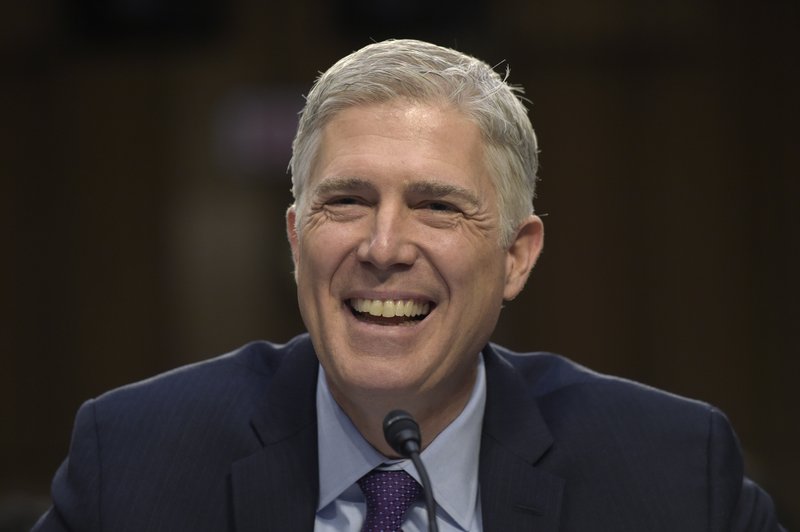
Supreme Court nominee Judge Neil Gorsuch is coming up for a vote in the Senate this month, with lawmakers debating the nomination of the Colorado judge to the highest court in the country. Like the late Justice Antonin Scalia, Judge Gorsuch has a track record of interpreting the Constitution as written and intended by the founders. He also served in the Justice Department, and clerked for Supreme Court Justices Byron White and Anthony Kennedy. For Latinos that value individual rights and the rule of law, there’s a lot to be excited about in his selection to fill the Supreme Court vacancy. Judge Gorsuch is an excellent pick to strengthen the free and open society that makes that dream possible. With millions of Latinos across the United States who value entrepreneurship and the American Dream, this is welcome news. Judges have a responsibility to protect our liberties from government meddling, and Judge Gorsuch has demonstrated that he will uphold Constitutional limits on government power no matter who is in charge — the foundation of a free and prosperous society. Far beyond his record as a defender of individual liberty, Judge Gorsuch’s career reflects a solid understanding of the way that progressive interpretations of regulatory and criminal codes have hurt the least fortunate and contributed to the two-tiered society that is emerging in this country. As a Supreme Court Justice, Judge Gorsuch shows promise that he would uphold the rights of all people — immigrants and native-born citizens alike. All of these issues disproportionately impact the Latino community. More than two hundred years of growing the size and scope of our government have taken their toll on the Constitution. If confirmed to the Supreme Court, Judge Gorsuch will interpret the law and the Constitution faithfully, rather than seeking to erode the checks on government power that it provides. An originalist interpretation of the Constitution, as championed by the late Justice Scalia, prevents judges from legislating from the bench and serves as a vital check against lawmaking by judicial fiat. Judge Gorsuch will help ensure that our constitutional rights are protected, while advancing the foundations of a free society through the rule of law. There are good reasons for Senators in both parties to support the confirmation of Judge Neil Gorsuch to the Supreme Court, and, in fact, he was unanimously approved to serve on the Court of Appeals — we encourage the Senate to show him the same wide support now. ___ Payton Alexander serves as a policy analyst for The LIBRE Initiative.
Jim Zeigler calls Cabinet re-org bill “power grab” by governor
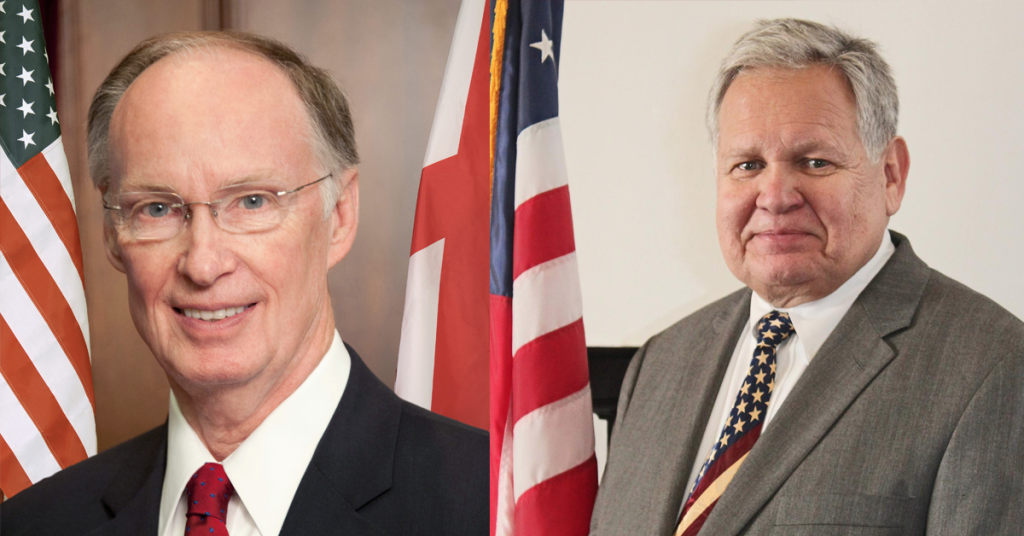
The elected status of the Alabama State Auditor is threatened by a plan now circulating in Montgomery, and current auditor Jim Zeigler does not take kindly to it. The bill — HB 432 by Rep. Paul Beckman, a Pratville Republican and sometimes ally of Gov. Robert Bentley — would alter the offices of State Auditor and Agriculture Commissioner, making them appointed by the governor’s office rather than elected statewide as state law currently provides. Zeigler, a Republican, has been a harsh critic of the Bentley administration in his tenure as State Auditor since taking office in 2015. He contends the move is retribution for his criticism on issues like taxes, state parks, and a move to spend some $1.5 million on renovating the abandoned governor’s residence in Gulf Shores for what Zeigler has characterized as personal reasons. Zeigler said the inclusion of the Ag Commissioner as part of the Cabinet shakeup is simply window dressing, “a strategy to make it look like they are not targeting me.” “I believe that I am the main target of this legislation,” said Zeigler of the proposal, taken up for the first time last week by the Constitution, Campaign and Elections Committee. He added that the move was bad policy because it would remove the independent oversight his office – a unique, ombudsman-like position – by making the office subject to the governor’s approval. “Having the Governor appoint the State Auditor would be the fox guarding the hen house,” Zeigler said. Zeigler also issued an appeal to supporters via Facebook and a news release, asking opponents of the bill to seek out members of the CCE committee and voice their concerns. “Simply ask the Committee member to vote ‘No’ on HB432, and keep the State Auditor an elected office that represents the people of Alabama instead of the interests of the Governor,” Zeigler urged over the weekend.
Bob Sparks: Another Antonin Scalia is not in the cards, no matter who appoints justice

The already heated political rhetoric about replacing the late Justice Antonin Scalia on the U.S. Supreme Court is a sad spectacle. It is unseemly. Some shared their relief that Scalia was dead via social media. Most showed far more class. Before Scalia’s body had even left the morgue in Texas, the politics of replacing him took center stage, literally. It was the opening topic at Saturday’s GOP debate in South Carolina. Republicans, of course, want another Scalia and are therefore advocating for a Republican president to fill the seat. Democrats, of course, want just the opposite and demand hearings on President Barack Obama’s impending nomination. While I would personally agree with Republicans on the desire to have another brilliant originalist on the court, there will not be another Scalia anytime soon. No matter who is appointed, Democrats can take comfort in that reality. Many of those supporting Justice Scalia did so mostly because he ruled according to their political or personal view of the issue. On the other hand, he infuriated his detractors by being on the “wrong” side of a legal issue and by the pointed way he told them why they were wrong. Scalia made it fun for some non-lawyers, including this writer, to read his opinions. Concurring opinions could sometimes be as entertaining as his scathing dissents. While his writings were enlightening, listening to him outline his view on the role of the judicial branch was another source of education. During his first term, Gov. Jeb Bush brought Scalia to Tallahassee to address the senior leadership of his Capitol staff and agencies. It was one of the most enlightening and educational hours many of us ever spent. The tributes, both kind and grudging, coming his way refer to him as a “conservative jurist.” That description is too simplistic to capture just who Antonin Scalia was. Anyone who truly listened to him describe the roles of all three branches of government as enshrined within the Constitution, came away with a better understanding of the genius of the founders. Those reading his opinions know just how difficult it is to label him merely as a conservative. At the same time, he did openly admit to being a social conservative An “originalist,” meaning one who takes the Constitution by the true meaning of the founders, is the only true legal pigeonhole in which Justice Scalia belonged. He railed against the Supreme Court, or any court, for creating new federal power that was not specifically granted in the Constitution. He thought courts were not empowered to assign new rights by decree. Such power, he believed, should remain with voters and legislatures, unless they ran afoul of the governing document. For example, Scalia joined with the majority to basically unleash more money into politics through the Citizens United decision. He believed the First Amendment prohibited legislatures from placing limits on a constitutionally protected activity (“speech”) as it was defined. That decision enrages liberals to this day. He also joined with the majority in another case where burning the American flag was given a green light. Such activity is protected free speech. “If it were up to me, I would have thrown this bearded, sandal-wearing flag burner into jail,” Scalia said later during a speech. “But it was not up to me.” The Constitution, in that case, won out over personal preference. Conservatives found that case very hard to swallow. Though not part of the decision, Scalia was known to have abhorred Roe v. Wade because it created a right not specified in the Constitution. His views gave Scalia opponents other sources of talking points to use against him during speeches and rallies. Scalia also held the view that using the equal protection clause to protect a fetus was not covered by the Constitution. “You don’t count pregnant women twice,” he said during a 60 Minutes profile in 2008. The Constitution, Scalia believed, is not the living, breathing document others believe it is. Some labeled him a Neanderthal for such thinking. He clearly recognized that society changes, but the remedy was basic. Voters can demand, and legislatures can pass, laws applicable to contemporary times. Courts, he rightly believed, were not lawmakers. Scalia will be missed by those who admired him for his intellect and his sense of humor. Liberal colleagues such as Ruth Bader Ginsberg and Elena Kagan are among them. Those listening to recordings of the Bush v. Gore arguments in 2000 may recall the difficulty Florida attorney Joe Klock had when assigning the wrong name to a justice more than once. Scalia showed his wit as he prepared to ask Klock a question. “Mr. Klock? I’m Scalia,” he deadpanned. Yes, he was. *** Bob Sparks is a business and political consultant and former chief spokesperson for the Florida Attorney General.
AP-NORC Poll: U.S. Christians, more than Muslims, need religious liberty protections
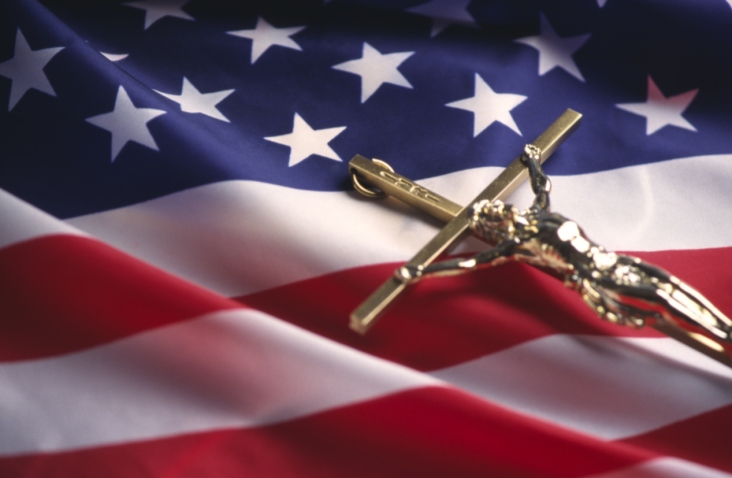
Americans place a higher priority on preserving the religious freedom of Christians than for other faith groups, ranking Muslims as the least deserving of the protections, according to a new survey. Solid majorities said it was extremely or very important for the U.S. to uphold religious freedom in general. However, the percentages varied dramatically when respondents were asked about specific faith traditions, according to a poll by The Associated Press and the NORC Center for Public Affairs Research. Eighty-two percent said religious liberty protections were important for Christians, compared with 61 percent who said the same for Muslims. About seven in 10 said preserving Jews’ religious freedom was important, while 67 percent said so of Mormons. People who identified with no religion were ranked about even with Muslims in needing support to live out their beliefs. Charles Haynes, director of the Religious Freedom Center of the Newseum Institute, said the findings reflect deep divisions among Americans about the very definition of religious liberty, which has taken on newly politicized meanings in a time of debate over gay marriage and the threat from Islamic extremists. “Religious freedom is now in the eye of the beholder,” Haynes said. “People in different traditions, with different ideological commitments, define religious freedom differently.” The poll was conducted Dec. 10 through Dec. 13, after Islamic extremist attacks in Paris and San Bernardino, California, and during intensifying anti-Muslim rhetoric by Donald Trump and other candidates for the Republican presidential nomination. The furor has led to a spike in vandalism of mosques and harassment of U.S. Muslims over the last month. In the survey, 88 percent of Republicans said it was important to protect the religious liberty of Christians, while only 60 percent said so for Muslims. Democrats also ranked religious freedom for Muslims as a lower priority. Eighty-three percent of Democrats said the protections were important for Christians, while only 67 percent said so for Muslims. A Pew Research Center survey last year found an increasing share of Americans believe Islam is more likely than other religions to encourage violence among its followers. Several outspoken critics have emerged who argue Islam itself is a threat to the U.S. “These numbers seem to be part of a growing climate of anti-Muslim sentiment in the United States,” said Madihha Ahussain, an attorney for Muslim Advocates, a California-based civil rights group. “This climate of hatred has contributed to dozens of incidents of anti-Muslim violence in recent weeks.” Helen Decker, 65, a West Texas Christian who reads the Bible regularly, believes strongly that religious freedom should be provided to people of all faiths or no faith, including for her grandson whom she said is an atheist. But she said Muslims can only earn the same religious liberty protections “under certain circumstances – that they can show that they are not a radical Muslim.” “Muslims – they need to be protected just like Christians, unless they pose harm to human life,” Decker said. But John Ashford of Chicago, who is retired from the U.S. military and the Postal Service, said “it’s not right” to deny religious liberty protections to Muslims. He said officials have been showing too much deference to Christians for political reasons, in what he considers a threat to the separation of church and state. “There’s supposed to be equal protection under the law – that’s what the Constitution says,” he said. “If you’re not doing that, you’re doing something wrong.” Public discussion about religious freedom in 2015 focused largely on demands for government accommodation for objectors to same-sex marriage, which became legal nationwide in June. The debate played out most dramatically in the conflict over Indiana’s Religious Freedom Restoration Act and in the case of Kentucky clerk Kim Davis, who spent five days in jail for refusing to issue marriage licenses to same-sex couples. Those who oppose steps to accommodate religious objections to same-sex marriage see such exemptions as an attempt to undermine newly won rights for gays and lesbians. But advocates for broad exemptions, including U.S. Roman Catholic bishops and Southern Baptist leaders, say the requests are in line with the longstanding American tradition of protecting individual conscience. Greg Scott of the Alliance Defending Freedom, a Christian public interest law firm, said a focus on protecting Christians right now “makes sense in that Christians today are facing mounting threats to their religious liberty by acts of state officials and bureaucrats.” AP-NORC polls have found dwindling confidence in the government’s defense of religious liberty, with 75 percent in 2011 saying the government was doing a good job, compared with 55 percent who said so this month. In the latest survey, eight in 10 Americans said it was very or extremely important for people like themselves to be allowed to practice their religion freely. But Eric Rassbach, an attorney with the Becket Fund for Religious Liberty, a public interest law firm that takes clients of all faiths, said “people may not realize you cannot have a system where there’s one rule for one group and another rule for a different group you don’t like.” “No religion is an island,” Rassbach said. “If somebody else’s religion is being limited by the government, yours is liable to be limited in the same way. Even if you only care about your own particular group, you should care about other groups, too, because that’s the way the law works.” The AP-NORC poll of 1,042 adults was conducted online and by phone using a sample drawn from NORC’s probability-based AmeriSpeak panel, which is designed to be representative of the U.S. population. The margin of sampling error for all respondents is plus or minus 3.9 percentage points. Republished with permission of the Associated Press.


